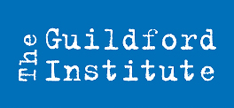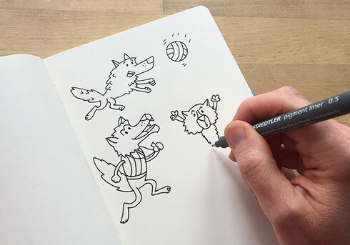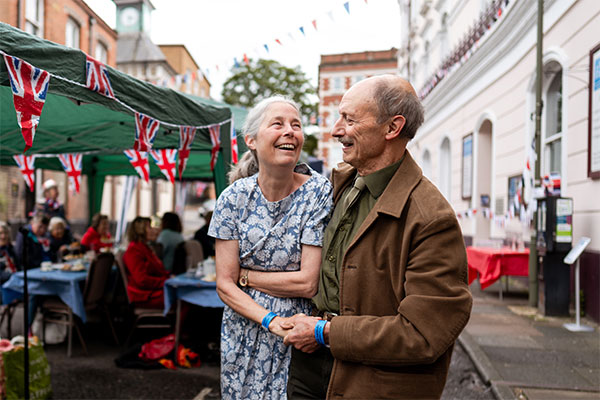In conversation with: Alice Fowler
Meet Alice Fowler, an award-winning writer based in Guildford. She is also a former creative writing student here at the Institute. Alice published her debut short story collection, The Truth Has Arms and Legs, last year, which has received wide acclaim. She will be giving a talk at our Members’ Coffee Morning on 8 March about her journey from student to published author. Ahead of this, we caught up with Alice to find out about her short story collection, writing inspiration, future work, and more!
Can you tell us about yourself and your background?
I’m an award-winning writer of short stories and longer fiction. My debut short story collection, The Truth Has Arms and Legs, was published by Fly On The Wall Press (an indie press based in Manchester) in July 2023. I’m delighted that the collection has gone to a third print run and was my publisher’s best-selling title last year. Before that, I worked for many years as a print journalist, first in local, then national newspapers, mainly as a feature writer and interviewer. While creative writing and journalism overlap in some ways, in others they’re quite opposing skills. Moving to Guildford, which I did with my family ten years ago, and enjoying the beautiful landscapes on our doorstep, has helped me write more freely.
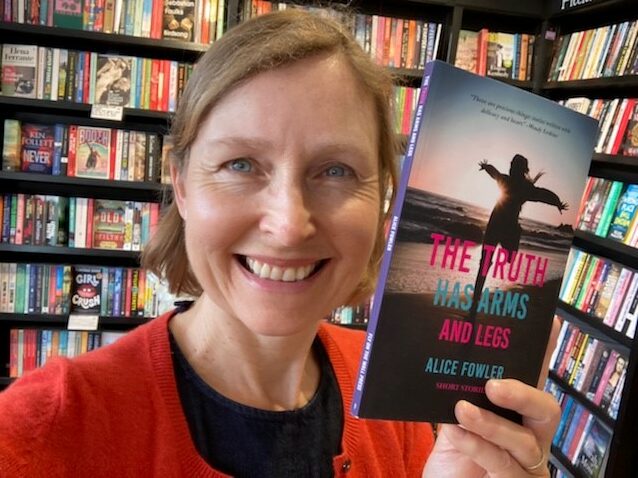
Was there anything or anyone who inspired your love of writing?
I think all writers are readers first, and that was certainly the case for me. The house where I grew up happened to be opposite a small branch library (now closed, sadly). I spent a lot of time there, reading through its shelves. I also remember the headmaster at my primary school teaching ‘composition’ – which really meant writing stories. I think that convinced me creative writing was a higher calling. Another influence was my mother, who loved books and read voraciously. Very sadly she passed away just before my book came out. However she did receive a copy, and I hope she read the acknowledgement at the end where I thanked her for inspiring me to write.
You were a student on Stella Stocker’s Creative Writing course here at the Institute. Tell us about your experience. Did the course help you to overcome any challenges in your writing process?
I thank Stella in my book’s acknowledgements as she too played a big part in my path to publication. I attended her course at the Institute for around two years. Stella’s classes are deceptively gentle, in that there is little formal teaching. Participants sit around a table, read out their work, and give and receive feedback. That is gold dust for any writer. When I arrived at Stella’s class, I’d say the editing muscle in my brain (honed in my journalism days) was still too strong. Stella’s perceptive and enabling comments, and those of fellow class members, helped me get over that. I remember to this day lines of poetry and prose that I heard read out by talented writers in the class.
What encouraged you to take the journey from student to published author?
I’d say the thing that helped me most was entering short story competitions. I started doing that in a very amateur way around six years ago and was lucky enough to have some immediate successes. I kept going and winning the Historical Writers Association short story competition in 2020 and the Wells short story competition in 2021 gave me a lot of encouragement. Most writers are prone to self-doubt, and I’m no exception, so encouragement of any kind means the world. I still thought it unlikely, given that the market for short stories is relatively small, that I would have a collection published. That The Truth Has Arms and Legs was accepted the first time I submitted it, and is selling well, has been a wonderful surprise.
The Truth Has Arms and Legs is your debut short story collection. Is there a theme that connects these stories together?
While the stories are all quite different – some contemporary, some historical – they all show characters at points of change. I’d say the theme that underlies them is resilience. Resilience is a quality that resonates with me personally and is something we all need in these challenging times. If I had to sum them up, I’d say they’re stories of change, resilience and hope.
What made you choose to write short stories?
I also spend a lot of time writing longer fiction – novels – so in many ways the short stories are a holiday from that! They’re great fun to write because everything is distilled – I try to delve deeply into character, just as in a novel, while also getting the satisfaction of completing something in a relatively short time. I recently heard the writer Wendy Erskine, whom I very much admire, saying short stories are like shots (the kind you drink). I agree – they’re powerful, but short-lived!
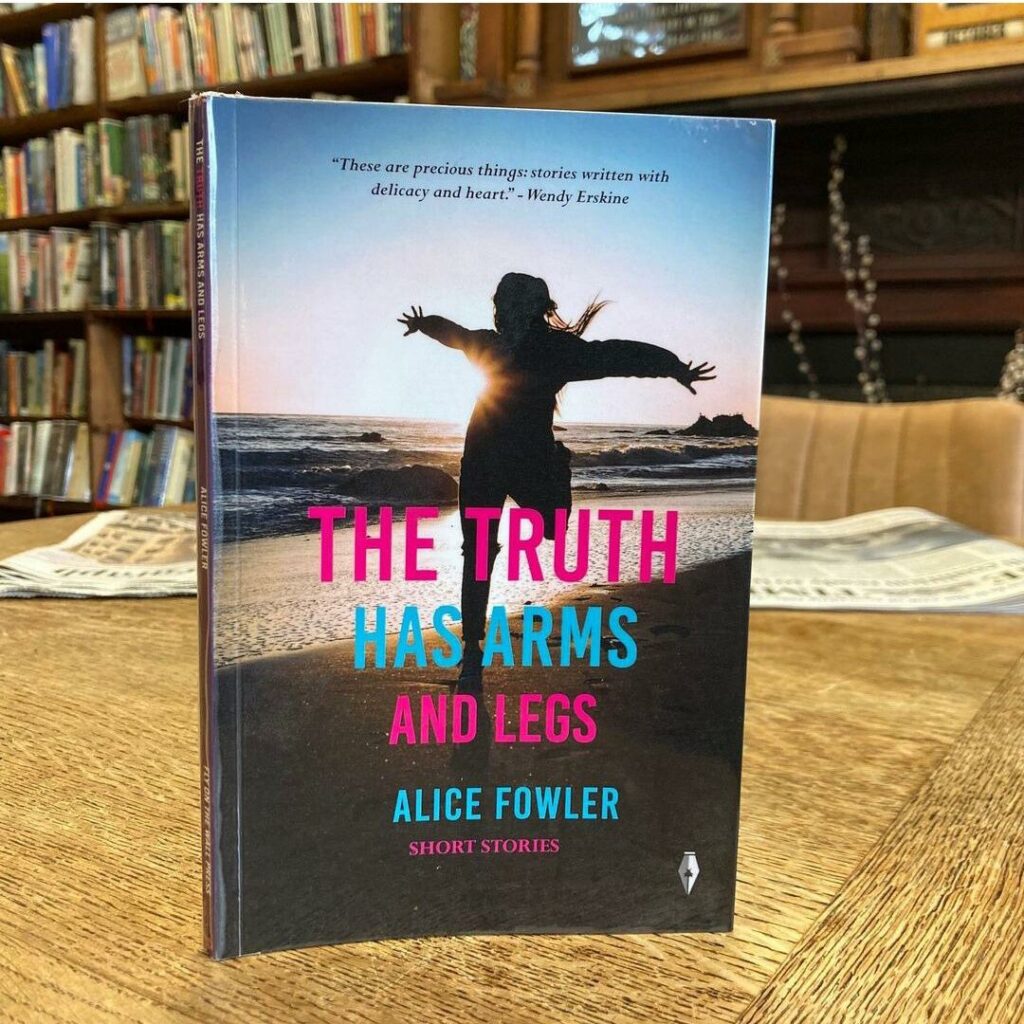
How did you come up with the title for The Truth Has Arms and Legs?
This is also the title of the last story in the book, in which an elderly woman, now an acclaimed cellist, remembers her childhood imprisonment at Auschwitz. The title came to me after I had completed the story. A motif of arms and legs – of paper dolls, toy farm animals, arms reaching up etc – runs through it. I also intend the title to suggest that the big events of history, that we may regard as ‘truth’, are made up of individual human lives and, often, suffering. The title came to me while walking with my dog on Merrow Down. I often find ideas bubble up from my subconscious while I’m walking. This is the story I will read from and discuss at the Institute’s Members’ Coffee Morning.
Is there a character from your collection that you relate to the most?
It’s probably Maggie Hoadley in the first story: the 1920s gypsy girl running barefoot against the village girls in shoes. I relate to Maggie’s experience in various ways. One of them is the transformative power of education. The lines: ‘Me? I’m the useless one. That’s what I used to think – until our school on wheels rolled in. Until I learnt to read’ come from a deep place. The story ‘Don’t Forget To Brush Your Feet’, about a mother home-schooling during the pandemic, while worrying that she’s forgetting words, is also quite personal, in that it’s rooted in my own experience of that time.
Would you recommend The Truth Has Arms and Legs as a book club choice?
Yes! One of the privileges of having my collection published has been going to book groups and listening as they discuss the stories. Because they touch on such a variety of themes – war, prejudice, motherhood, inequality, dementia, nature, aging and so on – they’re great for engendering discussion. A reader posted a review recently saying: ‘This exceptional collection of short stories ignited numerous debates at our recent book club meeting’. I was very glad to hear that.
Finally, can you tell us what you’re working on next?
I’m working on a historical novel, set in mid-Victorian Guildford, and partly inspired by two real-life characters who lived here. It explores identity and the boundaries between friendship and love. Recently I’ve been lucky enough to spend an extremely hard-working week at a residential library, which has helped me make a lot of progress, so I’m feeling optimistic. To come full circle back to The Guildford Institute, I should add that the very first, embryo chapter of this novel was read out at Stella’s class!
If you’d like to meet Alice and find out more about her short story collection, join us for our Members’ Coffee Morning on Friday 8 March at 10.30am. Free to attend for Institute members only, book your free place.
